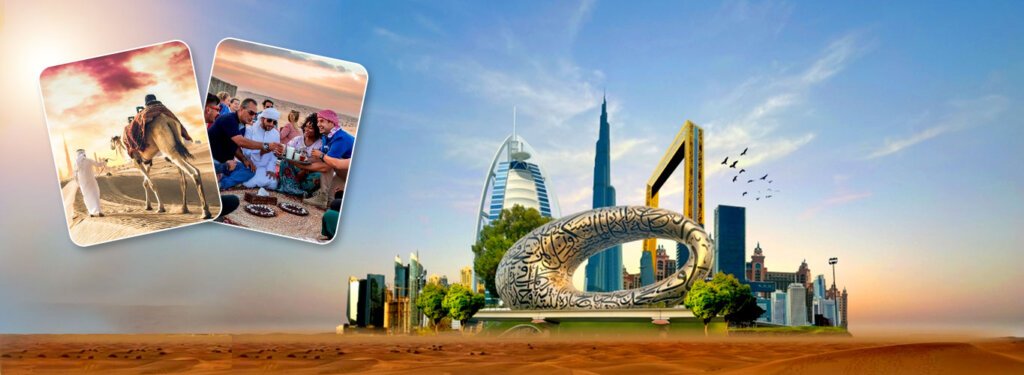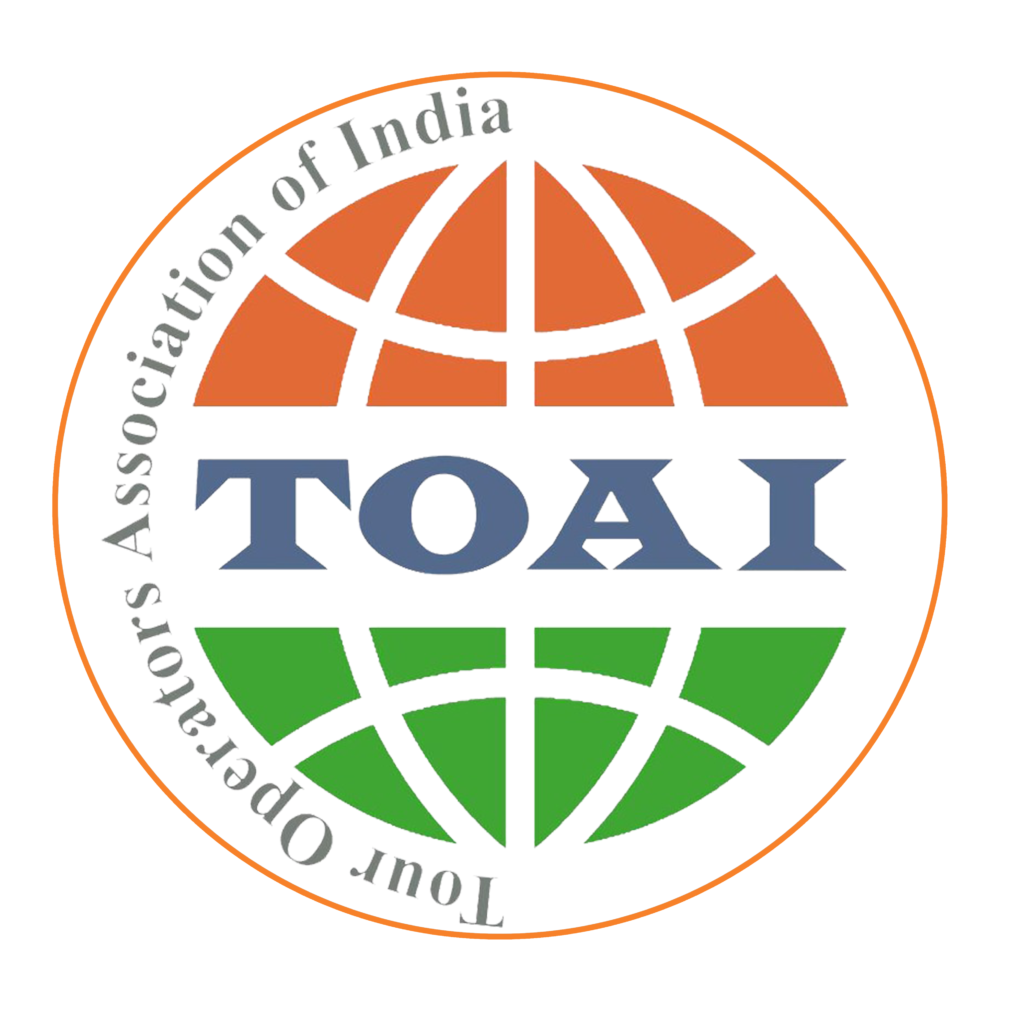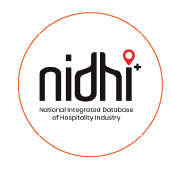
South India's No. 1 Travel Agency ✨
💱 Currency
United Arab Emirates Dirham (AED
🗣️ Languages
Arabic (English is widely spoken, especially in tourist and commercial areas)
🌤️ Climate
15°C – 45°C (hot desert climate; extremely hot summers and mild winters)
📅 Best Season
November – March (Pleasant weather ideal for outdoor activities and sightseeing)
🛡 Must-Know Travel Tips for Visiting Dubai
- 🏧 ATMs are widely available in Dubai, including at malls, metro stations, and hotels — most accept international cards without issue.
- 💳 Credit and debit cards are accepted almost everywhere, including taxis, shops, and restaurants — cash is mainly used in small markets or for tipping.
- 🏦 Banks usually operate Sunday to Thursday (8 AM – 3 PM); some branches in malls are open later. Friday is a holiday in many institutions.
- 🍷 The legal drinking age in Dubai is 21. Alcohol is only served in licensed bars, restaurants, and hotels — not in public places.
- 🤝 Dubai is culturally conservative — dress modestly, avoid public displays of affection, and respect Islamic customs, especially during Ramadan.
- 💰 While Dubai can be luxurious, budget-friendly options exist — plan ahead for deals on hotels, tours, and Dubai tour packages during off-peak months.
What Is Dubai Famous For? – About Dubai Explained
Dubai is a global hotspot for luxury, innovation, and culture, and many travelers explore it through curated Dubai tour packages that showcase its most iconic attractions. Dubai, one of the seven emirates of the United Arab Emirates (UAE), is internationally famous for its ultra-modern skyline, opulent lifestyle, and ambitious architecture. What started as a modest desert trading post has transformed within just a few decades into a global tourism and business hub. Dubai’s skyline is dominated by the iconic Burj Khalifa—the world’s tallest building and a striking emblem of the city’s forward-looking ambition.Other iconic landmarks like the Palm Jumeirah, a man-made island shaped like a palm tree, and the luxurious Burj Al Arab, known as the world’s only “seven-star hotel,” attract millions of international tourists each year.
Beyond architecture, Dubai is also known for its luxury shopping malls, including the Dubai Mall and Mall of the Emirates, which blend retail therapy with entertainment like indoor ski slopes, giant aquariums, and theme parks. Its reputation as a tax-free shopping destination has made it a favorite for global luxury brands and bargain hunters alike. Culturally, Dubai is known for offering a fusion of Arab traditions and cosmopolitan lifestyles, where you can find traditional souks and mosques side by side with gourmet restaurants and nightclubs.
Another reason Dubai stands out is its position as a major aviation and trade hub. Dubai International Airport (DXB) is one of the busiest in the world, making it a convenient transit point for travelers. The city is also popular for desert adventures, from dune bashing and camel rides to overnight desert camps that feature traditional music, belly dancing, and Arabic cuisine. With year-round sunshine, pristine beaches, and a welcoming tourism infrastructure, Dubai has become a symbol of what’s possible when ambition, innovation, and investment converge.
Dubai Tour Packages
Most Chosen Dubai Tour Plans by Our Happy Customers
How Are India and Dubai Connected? – Cultural & Historical Ties
India and Dubai share deep-rooted connections that span trade, migration, culture, and diplomacy. Historically, Dubai’s early economy was closely linked to Indian merchants who played a key role in the pearl trade and textile industry during the 19th and early 20th centuries. Many Indian traders settled in Dubai long before the oil boom and helped shape its early commercial scene. Even today, areas like Bur Dubai and Deira showcase this history through temples, spice markets, and Indian-run shops that have existed for decades.
In modern times, Dubai is home to one of the largest Indian expatriate communities in the world, with over 3 million Indians living and working in the UAE, contributing significantly to its economy. The Indian influence is evident in everything from cuisine and film to festivals and fashion. Bollywood movies are widely popular in Dubai, and festivals like Diwali, Holi, and Onam are celebrated with enthusiasm across the city, with events hosted in malls, parks, and cultural centers.India and the UAE share robust diplomatic relations, strengthened by trade collaborations, energy alliances, and strategic bilateral partnerships. Direct flights from almost every major Indian city to Dubai have enhanced people-to-people connectivity and made Dubai one of the top international destinations for Indian tourists, entrepreneurs, and job seekers. Indian food, clothing, music, and even Ayurveda are widely available in Dubai, offering a sense of familiarity for Indian visitors while also allowing them to engage with the multicultural and Arab charm that defines Dubai.
Interesting Things to Know About Dubai Before You Go
Before heading to Dubai, travelers should understand that the city is a unique blend of strict traditional values and modern, global lifestyles. While it is known for its liberal business environment and luxury tourism, it remains rooted in Islamic customs. Public behavior is expected to be respectful—modest clothing in public spaces is encouraged, public displays of affection should be minimal, and during the holy month of Ramadan, eating or drinking in public during daylight hours is discouraged.
Dubai is incredibly safe, with low crime rates and high standards of cleanliness. The official currency is the UAE Dirham (AED), and most establishments readily accept major credit cards.However, having some cash for small purchases or taxis is advisable. English is widely spoken, especially in tourism, retail, and hospitality sectors, making communication easy for most international visitors.Getting around is also convenient. The Dubai Metro is efficient, air-conditioned, and connects key parts of the city, including the airport, malls, and business districts. Taxis are plentiful, and ride-hailing apps like Careem and Uber operate smoothly. Keep in mind that Dubai is very hot for much of the year, especially between June and September, so the best time to visit is from November to March, when the weather is pleasant. Another important detail is that Dubai follows strict laws regarding alcohol, drugs, and online behavior. Alcohol is served only in licensed restaurants, hotels, and clubs, and being drunk in public can lead to fines or legal trouble. It’s also illegal to photograph people—especially women—without permission. Knowing these cultural and legal norms ensures that tourists have a respectful and enjoyable experience. Overall, Dubai is a fascinating destination where preparation meets indulgence, and modernity meets tradition.
What to Know Before Booking a Dubai Tour Package
Dubai is a city that offers a fascinating contrast between ancient Arabian culture and futuristic ambition. From traditional souks and desert camps to glittering skyscrapers and man-made islands, planning a trip here requires careful consideration of timing, logistics, and the kind of experience you’re after.To start, it’s important to decide what kind of traveler you are. If you enjoy luxurious resorts, fine dining, yacht cruises, and premium shopping, the city caters wonderfully to upscale preferences. On the other hand, if you’re a culturally curious traveler looking for history, budget street food, museums, and local interaction, there’s just as much depth to explore. Your interests should guide what kind of itinerary and accommodation you go for. Dubai is efficiently planned and warmly welcomes travelers from around the world with its tourist-friendly infrastructure.English is widely spoken, and the infrastructure is modern. Booking accommodations in areas like Downtown Dubai, Bur Dubai, or Dubai Marina makes it easier to access popular sites and Metro stations. Hotels range from lavish resorts with private beaches to more modest but clean options offering great value.Next, consider the timing of your trip. From November to March, the weather is cool and pleasant, perfect for desert activities, walking tours, and beach time. The summer months, from June to September, are extremely hot—temperatures often soar above 40°C—but hotel rates are lower, and shopping malls offer air-conditioned refuge and summer sales.
Packages may or may not include certain essentials. Always double-check whether your plan includes airport transfers, sightseeing entry tickets, local taxes, breakfast, or visa assistance. If not, you may need to budget separately for these. Also, plan for local expenses like meals, tips, souvenirs, and public transport cards.Another crucial element is cultural sensitivity. Dubai is relatively liberal, but being a part of the UAE, it still adheres to Islamic traditions. Travelers should dress modestly in public places, especially religious sites, and avoid public displays of affection. During Ramadan, daytime food service may be limited, and it’s customary not to eat or drink in public until after sunset.Health insurance isn’t mandatory but is highly recommended. Also, check passport validity—most countries require it to be valid for at least six months from your travel date. Mobile SIMs are easily available at the airport, and internet connectivity is excellent in most urban areas.Finally, review reviews of travel agencies, guides, or platforms you book through. Ensure they are well-rated, responsive, and transparent about inclusions, refund policies, and safety protocols. Booking in advance for activities like visiting the top of the Burj Khalifa or desert safaris ensures smoother travel and avoids last-minute disappointments.
Which Are the Best Budget Dubai Tour Packages?
Dubai’s glamorous image often overshadows how accessible it can be for budget-conscious travelers. With the right planning, you can enjoy a full, exciting experience in the city without spending a fortune.Start with where you stay. Areas like Deira, Al Barsha, Al Rigga, and Bur Dubai are excellent for budget hotels that still offer comfort, cleanliness, and proximity to Metro stations. These zones are also filled with local eateries, budget shops, and access to main attractions via public transport.Transportation is where you can save big. The Dubai Metro offers a quick, spotless, and budget-friendly way to reach the city’s major attractions. Get a Nol card for seamless access to Metro, buses, and trams. Avoid taxis except during emergencies or at night when public options are limited.Several must-see attractions are either free or cost very little. The Dubai Fountain show at the base of Burj Khalifa is free and happens every 30 minutes in the evening. Walk through the Dubai Mall to see its massive aquarium from the outside, or stroll through Al Seef or Al Fahidi Historical District to experience old-world charm.
For a beach day, visit public beaches like Kite Beach or JBR Beach, which offer stunning views, free entry, and pay-per-use facilities. Bring your own towel, water, and sunscreen to avoid rental fees. These beaches are also great for people-watching, seaside cafes, and water sports at a lower cost than private resorts.Budget-friendly food is abundant. Indian, Pakistani, Bangladeshi, and Filipino restaurants offer tasty meals under AED 30. Try places like Ravi Restaurant in Satwa, Al Ustad Special Kebab near Al Mankhool, or the local cafeterias spread across Deira. Food courts in malls also offer generous portions at decent prices.Several budget tour operators offer combo deals that include city tours, desert safaris with BBQ dinner, and dhow cruises with music and food at affordable prices. If you’re traveling in a group, you can negotiate better rates or opt for shared tours.Souvenir shopping doesn’t have to break the bank. Explore Meena Bazaar, the Spice Souk, and the Gold Souk for great finds—haggling is part of the experience, so feel free to negotiate prices.Dragon Mart is another great destination for cheap electronics, accessories, and gifts.To enjoy cultural events, look for festivals like the Dubai Shopping Festival or Global Village, where entertainment and shopping come together at low costs. Museum visits (like the Etihad Museum or Dubai Museum) have minimal entrance fees and provide rich insights into the city’s roots.Avoid buying bottled water at tourist attractions—it’s marked upBring a reusable water bottle and stay hydrated throughout the day, especially in the heat. Also, pack essentials like a travel adapter, flip-flops, sunscreen, and a cap to avoid having to buy these at tourist prices.
Quick Facts About Dubai – Geography, Wildlife & People
Dubai is an awe-inspiring destination that stands out for its blend of innovation, tradition, and natural desert beauty. For any traveler creating a thoughtful Dubai tour plan, understanding the city’s geography, environment, and cultural fabric can elevate the entire experience.
Location & Geography
Dubai is located along the southeast coast of the Persian Gulf, part of the United Arab Emirates. The terrain is dominated by golden deserts, low-lying coastal plains, and scattered salt flats. The city’s striking skyline emerges dramatically from this flat desert environment, making it one of the most recognizable skylines in the world. It borders the emirates of Sharjah and Abu Dhabi and serves as a major gateway for Middle Eastern and international travel.
Urban Districts & Cityscape
Dubai is divided into vibrant zones, each with a distinct personality. Downtown Dubai is home to the towering Burj Khalifa and sprawling Dubai Mall, while nearby Business Bay serves as the city’s bustling commercial district. Jumeirah and Dubai Marina provide chic waterfront living and nightlife, and Old Dubai—home to areas like Deira and Bur Dubai—offers historical souks, mosques, and traditional architecture. The city also features artificial islands like Palm Jumeirah and The World, showcasing Dubai’s daring architectural ambition.
Wildlife & Nature Conservation
Although best known for its skyscrapers and luxury, Dubai is home to carefully preserved ecosystems. Ras Al Khor Wildlife Sanctuary—just minutes from the city center—is a wetland reserve that welcomes thousands of migratory birds each year, especially flamingos. The Dubai Desert Conservation Reserve protects endangered species like the Arabian oryx, desert foxes, and wild gazelles. Public parks, botanical gardens, and green belts are spread throughout the city, making nature surprisingly accessible.
People & Multicultural Diversity
Dubai is a multicultural metropolis with a population made up of over 85% expatriates. Emiratis, while a minority, play a central role in governance, culture, and public life. The city thrives on diversity, with large communities from South Asia, the Philippines, Europe, and Africa. This mix is visible in everything from the variety of cuisines and languages spoken to festivals, places of worship, and daily interactions. Cultural tolerance and peaceful coexistence are key aspects of social life here.
Language & Communication
Arabic is the official language, but English is spoken almost everywhere—especially in tourism, business, and hospitality. You’ll also hear Hindi, Urdu, Malayalam, Tagalog, and other languages in local markets and neighborhoods. Most road signs, menus, and transportation instructions are bilingual (Arabic and English), making it easy for international travelers to get around.
Cultural Etiquette & Social Norms
Dubai maintains a respectful balance between its Islamic values and global openness. Visitors should dress modestly in public, especially in mosques or government buildings. Public displays of affection, loud arguments, and drunkenness are discouraged and can be penalized. During Ramadan, it is important to refrain from eating or drinking in public during daylight hours as a sign of respect for those who are fasting.
Natural Wonders & Adventures
The surrounding deserts offer opportunities for thrilling outdoor adventures—dune bashing, camel riding, sandboarding, and desert camping under starry skies. Beaches along the coast, such as Kite Beach and JBR Beach, are clean and open to the public, offering water sports and relaxation.
Dubai’s ability to balance its deep-rooted traditions with futuristic vision makes it an unforgettable destination. Whether you’re a nature lover, culture enthusiast, or thrill-seeker, these facts provide a foundation for experiencing Dubai with more understanding and depth.
Dubai Tour Packages
| High season | November to March (Pleasant winter weather, ideal for sightseeing) |
|---|---|
| Iconic Attractions | Burj Khalifa, Palm Jumeirah, Dubai Mall, Dubai Marina, Dubai Frame, Desert Safari Camps |
| Popular Activities | Desert Safari, Dhow Cruise, Skydiving, Shopping Festivals, Luxury Dining, Beach Sports |
| Visa | Visa on arrival for Indian passport holders with valid US/UK/Schengen visa; otherwise, pre-approved visa required |
| National Animal | Arabian Oryx |
| National Flower | Tribulus Omanense (a small yellow desert flower) |
| Famous Food | Shawarma, Al Harees, Machboos, Falafel, Luqaimat (sweet dumplings), Stuffed Camel |
Top 10 Reasons Why Tourists Love Visiting Dubai
Dubai continues to attract millions of travelers each year with its dazzling combination of modern luxury, cultural depth, and family-friendly experiences. One of the top reasons tourists love visiting Dubai is its spectacular architecture, with landmarks like the Burj Khalifa, Burj Al Arab, and Palm Jumeirah symbolizing futuristic ambition. These structures offer stunning views, sky-high dining, and unforgettable photo opportunities that leave a lasting impression.Another major appeal is shopping—Dubai is considered a global retail paradise, with everything from luxury brands in Dubai Mall to bargaining at traditional gold, spice, and textile souks. The city also hosts the Dubai Shopping Festival, which transforms the entire emirate into a month-long shopper’s dream with mega deals, concerts, and raffles. For those seeking adventure and nature, Dubai’s golden sand dunes provide thrilling desert safaris, camel rides, quad biking, and starlit Bedouin-style camps.Dubai is also a culinary melting pot, offering world-class international cuisine alongside Emirati dishes. From high-end rooftop restaurants to street shawarma joints, foodies find a rich range of flavors. The city’s dedication to family-friendly entertainment is another draw—places like Dubai Parks and Resorts, Aquaventure Waterpark, Dubai Aquarium, and IMG Worlds of Adventure provide fun for kids and adults alike.Despite its modern appearance, Dubai embraces its cultural roots through attractions like Al Fahidi Historical District, Dubai Museum, and traditional dhow cruises on Dubai Creek. Travelers appreciate the contrast where ultra-modern skyscrapers stand alongside historic souks, creating a unique blend of past and present. Cleanliness, safety, and hospitality are additional reasons people feel comfortable returning.Finally, Dubai’s year-round sunshine, world-class hospitality, visa-friendly policies for Indian tourists, and excellent flight connectivity make it an ideal getaway. Whether it’s luxury, culture, shopping, or relaxation, Dubai has something for every kind of traveler—making it one of the most loved travel destinations in the world.Many travelers looking for more than just sightseeing include these immersive experiences in their personalized Dubai tour packages, ensuring their journey is not only luxurious but also deeply enriching.
When Is the Best Time to Visit Dubai for Safari or Travel?
The best time to visit Dubai for both desert safari adventures and general sightseeing is during the cooler months from November to March. This season brings comfortable daytime temperatures between 20°C and 30°C, making it perfect for sightseeing and enjoying desert adventures.This is the peak tourist season when Dubai is at its liveliest, with festivals, open-air markets, and clear skies enhancing the city’s vibrancy. Desert safaris are particularly popular during these months—visitors can comfortably enjoy dune bashing, sandboarding, camel rides, and barbecue dinners under the stars without the discomfort of extreme heat.If you’re planning your trip purely around affordability and fewer crowds, consider late October or early April, which offer a balance between good weather and more budget-friendly rates. Summer months—June through September—should generally be avoided for safaris or outdoor travel, as temperatures often soar above 45°C, limiting most activities to air-conditioned venues. However, those months are ideal for travelers focused on indoor entertainment like theme parks, shopping malls, and cultural museums due to off-season discounts.Dubai’s calendar also features exciting events like the Dubai Shopping Festival (December–January) and Dubai Food Festival (February–March), which add even more value to your visit. So for the best overall travel experience—especially for desert adventures—the winter season remains the top choice.
What Are the Best Things to Do in Dubai?
Dubai offers an incredible range of attractions that cater to every type of traveler—from thrill-seekers and families to history buffs and luxury lovers. One of the must-do experiences is visiting the Burj Khalifa, the tallest structure in the world. From its observation deck, visitors enjoy sweeping views of the city, the coastline, and the vast Arabian desert. Right next door is the Dubai Mall, a shopper’s paradise that also houses an aquarium, ice rink, and hundreds of global brands.No trip to Dubai is complete without a desert safari, where you can ride over golden dunes, try sandboarding, and end the evening with traditional Emirati entertainment and cuisine. Beach lovers will enjoy the soft sands of JBR Beach, La Mer, and Kite Beach, while adventure enthusiasts can try indoor skiing at Ski Dubai, skydiving over Palm Jumeirah, or zip-lining through the urban skyline.Cultural experiences are equally rewarding. Take a walk through Al Fahidi Historical District, visit the Dubai Museum, or take an abra (traditional boat) ride across Dubai Creek. The Dubai Frame and Museum of the Future are newer landmarks offering immersive experiences that blend past, present, and future. For families, Dubai Parks and Resorts, Aquaventure Waterpark, and Global Village offer days of entertainment. Whether you’re after luxury, culture, adventure, or leisure, crafting a smart Dubai tour plan helps you make the most of everything this dynamic city has to offer.
What Food Is Dubai Known For? – A Guide to Dubai Cuisine
Dubai’s culinary scene is a flavorful blend of Emirati tradition and international influences, reflecting its position as a global crossroads. While you’ll find high-end restaurants from nearly every major cuisine in the world, it’s the authentic Emirati dishes and Middle Eastern flavors that define the true taste of Dubai. Start with Al Harees, a slow-cooked wheat and meat dish, or Machboos, a spiced rice meal often served with lamb, chicken, or fish. Shawarma, Dubai’s most popular street food, is available on nearly every corner—flavorful, juicy, and wrapped in warm bread with garlic sauce or tahini.Sweet lovers should try Luqaimat, golden dumplings drizzled with date syrup or honey, usually served during Ramadan. Stuffed vine leaves, falafel, and hummus reflect Levantine influences, while the strong use of saffron, cardamom, and rose water speaks to Persian and Indian culinary heritage. Seafood is also a major part of the cuisine due to Dubai’s coastal location—grilled hammour (grouper) and shrimp biryani are commonly featured in traditional menus.International food is equally dominant—Indian, Pakistani, Filipino, Italian, and East Asian cuisines are widely available, making dining a truly global experience. Whether you’re dining at a high-end hotel restaurant, a beachside café, or a humble roadside joint in Deira or Karama, Dubai’s food scene never disappoints. Food festivals and dining tours also give visitors a chance to explore diverse flavors in one of the world’s most food-obsessed cities.
Dubai Tour Packages
| Dubai City | Burj Khalifa, Dubai Mall, Dubai Fountain, Sky Views Observatory, Downtown Skyline |
|---|---|
| Palm Jumeirah | Atlantis The Palm, Aquaventure Waterpark, The Pointe, Beach Clubs |
| Bur Dubai & Deira | Dubai Museum, Al Fahidi Historical District, Gold & Spice Souks, Abra Ride on Dubai Creek |
| Expo City Dubai | Innovative Pavilions, Gardens, Cultural Shows, Sustainability & Tech Exhibits |
| Dubai Marina & JBR | Ain Dubai, Marina Walk, Beachfront Dining, Skydive Dubai |
| Desert Safari Region | Dune Bashing, Camel Rides, Desert Camps, BBQ Dinners, Falcon Shows |
| Global Village Area | Multicultural Pavilions, Stage Performances, Food Stalls, International Shoppingl |
What Should Indian Travellers Know Before Visiting Dubai?
For Indian travellers, Dubai is one of the most accessible and welcoming international destinations, but a smooth trip depends on knowing key cultural, legal, and practical aspects. This can be applied through an airline, travel agent, or online visa facilitation service, and approvals are typically quick if documentation is accurate. Dubai offers e-visa options for tourists, making it relatively hassle-free. Additionally, flights from India to Dubai are frequent and budget-friendly, with major airlines operating daily from cities like Delhi, Mumbai, Bengaluru, Chennai, and Kochi.
While Dubai is very international in appearance, it follows Islamic laws and local customs strictly. During Ramadan, eating or drinking in public during daylight is discouraged. Public displays of affection, disrespectful gestures, or loud behavior in public areas may attract legal attention. Alcohol consumption is allowed only in licensed venues, and being drunk in public is a punishable offense.Indian travellers will find many comforts in Dubai. Indian food is widely available, from fine dining to affordable eateries. Indian cultural presence is also strong—temples, Bollywood movies, and festivals like Diwali and Holi are celebrated widely. Currency exchange is easy, and Indian debit/credit cards are accepted in most malls and hotels. Most importantly, Dubai is extremely safe, clean, and tourist-friendly. With respect for local customs and a bit of planning, Indian tourists will find their Dubai experience both exciting and deeply enjoyable.
Where to Shop in Dubai – Best Markets & Souvenirs
Dubai is world-famous for shopping, offering everything from ultra-modern malls to centuries-old traditional souks. Whether you’re looking for gold, electronics, perfumes, spices, or designer clothing, the variety is endless. The most iconic place to shop is the Dubai Mall, one of the world’s largest, housing luxury brands, department stores, and unique experiences like an aquarium and indoor ice rink.
For more local flavor, traditional markets (souks) offer unique souvenirs and a cultural shopping experience. The Gold Souk in Deira is a must-visit—it features hundreds of retailers selling 22K and 24K gold, often at better rates than in India. Perfume Souk, also in Deira, allows you to create your own customized scent. At the Textile Souk in Bur Dubai, you’ll find rich fabrics, Indian-style clothing, pashmina shawls, and tailoring services on-site.If you’re visiting during the Dubai Shopping Festival (December–January), you’ll enjoy massive discounts across malls and markets, live entertainment, raffles, and pop-up fashion shows. Popular souvenirs to take home include Arabic coffee sets, dates, camel milk chocolates, oud perfumes, glass-blown ornaments, and handcrafted lanterns. Bargaining is acceptable in traditional souks but not in malls. For Indian shoppers, Dubai offers a perfect mix of affordability, variety, and luxury all under one roof.
How Is the Art and Culture Scene in Dubai?
Dubai’s art and culture scene is an extraordinary fusion of tradition and modernity, reflecting the city’s journey from a humble fishing village to a futuristic metropolis. While most travelers initially come to Dubai for its skyscrapers and shopping malls, they often leave with a deep appreciation for its rich Emirati heritage, vibrant creative spaces, and diverse global cultural influences.
At the core of traditional Emirati culture is the Al Fahidi Historical District, located near Dubai Creek. This restored neighborhood transports visitors to 19th-century Dubai, with its wind-tower architecture, sandy lanes, and cultural institutions like the Sheikh Mohammed Centre for Cultural Understanding, which promotes dialogue between locals and tourists through Emirati cuisine, guided mosque visits, and Q&A sessions on local customs. The Dubai Museum, housed in the 18th-century Al Fahidi Fort, offers a journey through time—displaying desert life, pearl diving history, tribal traditions, and the early days of trade that shaped the city’s identity.Modern Dubai, however, tells a parallel story of cultural expansion. The city has evolved into a regional creative capital with thriving artistic districts. Alserkal Avenue, located in the industrial area of Al Quoz, is a cutting-edge art hub filled with galleries, concept spaces, design studios, arthouse cinemas, and experimental exhibitions. Local and international artists showcase work spanning contemporary art, photography, installations, and multimedia performances. Jameel Arts Centre, located on the Dubai Creek waterfront, offers rotating exhibitions, artist residencies, and community programs that highlight themes ranging from environmental consciousness to digital storytelling.This iconic venue in Downtown Dubai hosts a variety of performances—including classical concerts, opera, ballet, Broadway musicals, and Arabic plays—appealing to a diverse audience and reinforcing Dubai’s global cultural stature. Throughout the year, Dubai celebrates artistic expression through international events like Art Dubai, Sikka Art and Design Festival, Dubai Design Week, and the Emirates Airline Festival of Literature—all of which attract global participation and elevate the city’s cultural scene.
Religious tolerance and diversity further enrich Dubai’s cultural atmosphere. With over 200 nationalities coexisting peacefully, the city supports various cultural centers and places of worship—from mosques and churches to Hindu temples and Sikh gurdwaras. Indian festivals such as Diwali, Navratri, and Onam are celebrated on a grand scale across the city, with community events, dance performances, and markets open to all.In every aspect—from architecture and performance arts to food, clothing, and literature—Dubai offers a powerful blend of heritage and innovation. It’s a city where centuries-old customs live side-by-side with global design trends and cutting-edge artistic expression.















